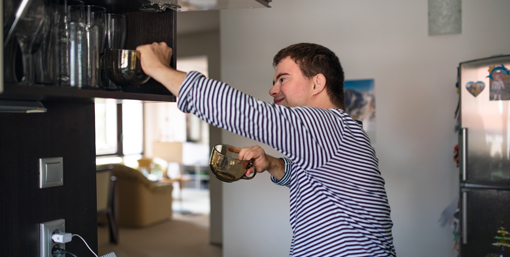The National Disability Insurance Scheme (NDIS) FAQs
Who is eligible for the NDIS?
To be eligible you’ll need to meet some basic criteria relating to your age, Australian Residency status and the nature of your disability. The NDIS also needs to be available in your area. You can find out if you meet the access requirements and check when the NDIS is rolling out in your area at www.ndis.gov.au
What is an NDIS plan?
Your NDIS plan is a document all about you and your life goals. It’s based on the details you provide in your initial planning meeting with your Local Area Coordinator (LAC). Your plan contains a breakdown of the different supports required to help you achieve your goals, along with how much funding has been allocated to each category.
What's covered by the NDIS?
The NDIS covers the cost of supports across a wide range of areas, from education, employment and community participation through to living arrangements, independence, health and wellbeing. What’s covered in your plan will really depend on your individual situation and life goals. The NDIS uses the ‘reasonable and necessary’ framework to determine what support you can be funded for. The NDIS can also fund Plan Management and Support Coordination. If you want to know more how the NDIS funds specific costs contact us through our Contact us page
Can I make changes to my NDIS plan?
If you want to later change something in your plan, you can always ask for a review of your plan. Make sure you explain as clearly as possible how and why you need to make the adjustments (for example, if your personal circumstances have changed).
We can help with any plan changes.
What is the difference between unregistered and registered providers?
The NDIS asks service providers to register with them. However, not all providers choose to register. The main difference between unregistered and registered providers is that only registered providers can claim their invoices with the NDIS directly.
What is supported independent living (SIL)?
Supported Independent Living is the funding for support workers to:
-
- Provide support in the house
- Help with community access outside of the home
- Helps the residents organise household tasks like preparing food, cooking, cleaning etc
- Manages the staff that work in the house
What supports are offered with SIL?
WHAT DOES IT COVER?
-
- Help with daily living tasks like shopping, cooking and cleaning
- Develop individual plans to help you achieve your goals
- Help you to access social and community activities
- Manage and attend appointments with you
WHAT DOESN’T IT COVER?
-
- Rent or Rent assistance
- Day to day living expenses
- Money for day to day groceries and paid activities
- Any items covered in other sections of the NDIS price guide
- Utilities like gas, electricity, water and telephone
- Assistive Technology or Transport costs
what are SIL Providers
A SIL Provider manages the supports on behalf of the client. Essentially, this means that a SIL provider will supply the staff to provide support for people in the household with daily living tasks. This is achieved by focusing on developing your skills so you can learn to live as independently as possible.
How do I get Supported Independent Living (SIL) funding?
Like all things with the NDIS, to get funding for something, it needs to be deemed reasonable and necessary by your NDIS planner.
When you go in to your planning meeting, you will need to explain to your planner why SIL funding is reasonable and necessary to your circumstances.
If we can give any tips on this it would be to:
Be prepared
We have found that the more someone prepares, the better their chances of receiving their best funding package.
Be clear
One of the most important things to remember going in to your meeting is that the NDIS Planner does not know you. They will only know what you tell them. If the need is urgent or pressing, you will need to articulate this to your planner.
If you need help contact us directly for a no-fee consultation.
Short term accommodation (STA)
Short Term Accommodation (STA), including respite, is funding for support and accommodation for a short time away from your usual home. It covers the cost of your care in another place for up to 14 days at a time. You might have a short stay with other people, or by yourself. It’s often funded when your usual carers aren’t available, or for you to try new things.
CLICK HERE For more information about what the NDIS say about STA
Independent Living Options (ILO)
Where we live, who we live with and the supports to live the life we want are very important to everyone.
Independent Living Options (ILO) are focused on working with the participant and their family to consider their needs and preferences, and design a flexible package of supports. Implementation often happens in stages and the package includes a primary support approach and supplementary supports. Once established the living arrangement is closely monitored and fine-tuned.
The following describes a variety of living arrangements under the ILO heading.
Co-Residency – supports reside full time or part-time in the participant’s home
Host Arrangements – participant resides full time in the home of a non-related host who provides support
Living Alone – support is provided in the home of the participant in a variety of ways
Living Together – participant lives with other people of their choice and receives support
Individual living options are often a viable alternative to a group home.
The NDIS encourage and support the introduction of ILO models in participant plans and are currently developing an ILO policy.
For more information please book in a time to talk with us.
